Dialogue
- 格式:docx
- 大小:20.53 KB
- 文档页数:6
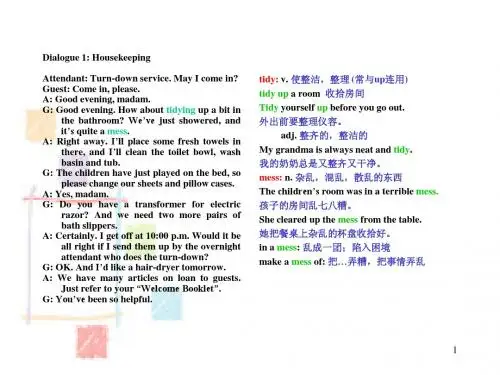
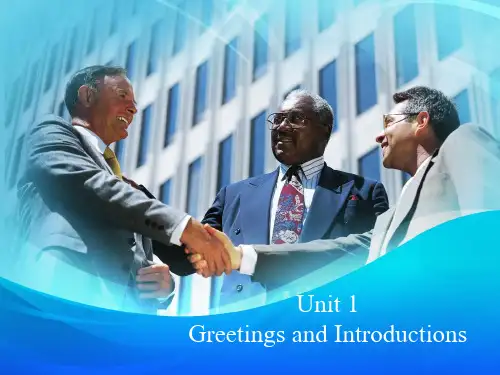
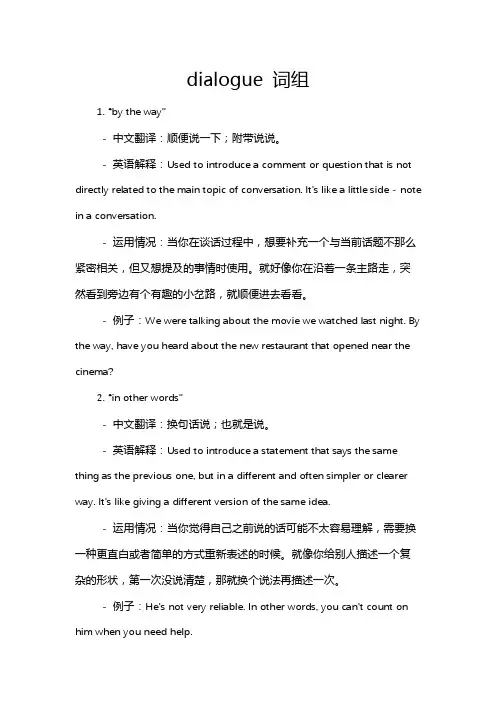
dialogue 词组1. “by the way”- 中文翻译:顺便说一下;附带说说。
- 英语解释:Used to introduce a comment or question that is not directly related to the main topic of conversation. It's like a little side - note in a conversation.- 运用情况:当你在谈话过程中,想要补充一个与当前话题不那么紧密相关,但又想提及的事情时使用。
就好像你在沿着一条主路走,突然看到旁边有个有趣的小岔路,就顺便进去看看。
- 例子:We were talking about the movie we watched last night. By the way, have you heard about the new restaurant that opened near the cinema?2. “in other words”- 中文翻译:换句话说;也就是说。
- 英语解释:Used to introduce a statement that says the same thing as the previous one, but in a different and often simpler or clearer way. It's like giving a different version of the same idea.- 运用情况:当你觉得自己之前说的话可能不太容易理解,需要换一种更直白或者简单的方式重新表述的时候。
就像你给别人描述一个复杂的形状,第一次没说清楚,那就换个说法再描述一次。
- 例子:He's not very reliable. In other words, you can't count on him when you need help.3. “on the contrary”- 中文翻译:正相反;恰恰相反。
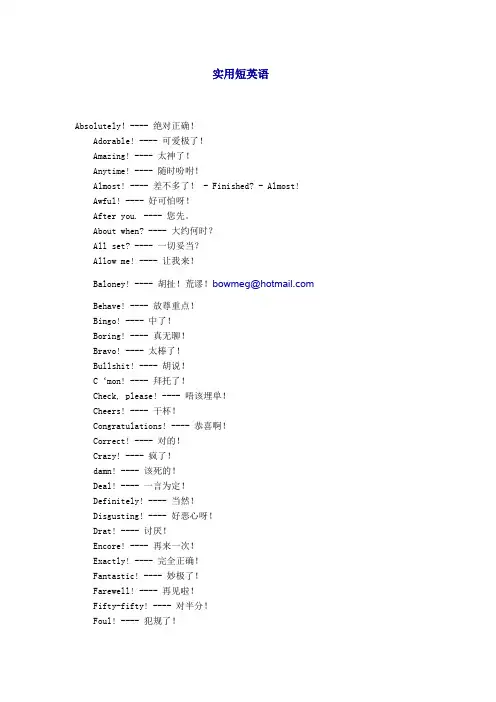
实用短英语Absolutely!---- 绝对正确!Adorable! ---- 可爱极了!Amazing! ---- 太神了!Anytime! ---- 随时吩咐!Almost! ---- 差不多了! - Finished? - Almost!Awful! ---- 好可怕呀!After you. ---- 您先。
About when? ---- 大约何时?All set? ---- 一切妥当?Allow me! ---- 让我来!Baloney! ---- 胡扯!荒谬!bowmeg@Behave! ---- 放尊重点!Bingo! ---- 中了!Boring! ---- 真无聊!Bravo! ---- 太棒了!Bullshit! ---- 胡说!C‘mon! ---- 拜托了!Check, please! ---- 唔该埋单!Cheers! ---- 干杯!Congratulations! ---- 恭喜啊!Correct! ---- 对的!Crazy! ---- 疯了!damn! ---- 该死的!Deal! ---- 一言为定!Definitely! ---- 当然!Disgusting! ---- 好恶心呀!Drat! ---- 讨厌!Encore! ---- 再来一次!Exactly! ---- 完全正确!Fantastic! ---- 妙极了!Farewell! ---- 再见啦!Fifty-fifty! ---- 对半分!Foul! ---- 犯规了!Fresh! ---- 好有型!帅!Gesundheit! ---- 保重!(特别用于对打喷嚏的人说)Gone! ---- 跑了!Gorgeous! ---- 美极了!Great! ---- 太好了!Hey! ---- 嘿!Hopefully! ---- 希望如此!有希望的话...Horrible! ---- 好可怕!Hot! ---- 好辣!Hurray!/Hurrah! ---- 万岁!Hush! ---- (肃静)嘘!Hurry! ---- 快点!Imagine! ---- 想想看!Impossible! ---- 不可能吧!Impressive! ---- 很感人,永生难忘!Incredible! ---- 不可思议!Indeed? ---- 真的?Jesus! ---- 天啊!Liar! ---- 你撒谎!Listen! ---- 听着!Lousy! ---- 差劲!Marverllous! ---- 棒极了!Now! ---- 现在就做!Objection! ---- 我抗议!Outrageous! ---- 不得了!Pardon! ---- 请再说一遍!Peekaboo! ---- 躲猫猫!Perfect! ---- 很完美!Please! ---- 拜托了!Present! ---- 到(有)!(用于点名时)Probably! ---- 很可能!Rats! ---- 差劲!Really? ---- 真的?Relax! ---- 放轻松!Right! ---- 对的!Satisfied? ---- 满意吗?Shhh... ---- 嘘...So so! ---- 马马虎虎!Someday! ---- 改天吧!Speaking! ---- (打电话时)我就是!Still? ---- 仍是这样?Stingy! ---- 小气鬼!Stop! ---- 停!Superb! ---- 棒极了!Sure! ---- 当然!Surprise! ---- 给你一个惊喜!Terrible! ---- 好可怕!Thirsty? ---- 渴吗!Toast! ---- 干杯!Try! ---- 去试一下!Unbelievable! ---- 难以置信!Understand? ---- 明不明白?Unisex? ---- 男女通用的?Wait! ---- 等一等!Well? ---- 怎幺样?Willingly---- 很乐意!Wow! ---- 哇!Yum... ---- 恩...(好吃!)nominated 被提名的;被任命的operate 操作,开动(机器等),经营(厂矿)originate 创始,发明organize 组织overcome 克服(困难等)participate in 参加perfect 使完善;改善perform 执行,履行plan 计划promote 生产,制造profit 利润promote 推销(商品);创立(企业等)be promoted to 被提升为be proposed as 被提名为;被推荐为provide 提供,供应reach 达到realize 实现(目标等);获得(利润)receive 收到,得到,接受rekon 计算(成本等)recognize 认清(职责等)recommended 被推荐的;被介绍的reconsolidate 重新巩固;重新整顿reconstruct 重建recorded 记载的recover 恢复;弥补rectify 整顿,调整redouble 加倍,倍增reduce 减少,降低(成本等)refine 精练,精制reform 改革registered 已注册的regenerate 更新,使更生regularize 使系统化regulate 控制(费用等)rehandle 重铸;重新处理rehash 以新形式处理(旧材料)reinforce 加强renew 重建,换新renovate 革新;修理repair 修复,修补replace 接替,替换representative 代表,代理人research 调查,研究resolve 解决set 创造(纪录等)settle 解决(问题等)shorten 减低......效能show 显示,表明significant 重要的,有效的simplify 简化,精简sort out 清理speed up 加速sponsor 主办spread 传播,扩大solve 解决standard 标准,规格streamline 把......设计流线型strengthen 加强,巩固study 研究succeed 成功supervise 监督,管理supply 供给,满足(需要) systematize 使系统化target 目标,指标test 试验,检验top 头等的,最高的total 总数,总额translate 翻译,转化travel 旅行well-trained 训练有素的。
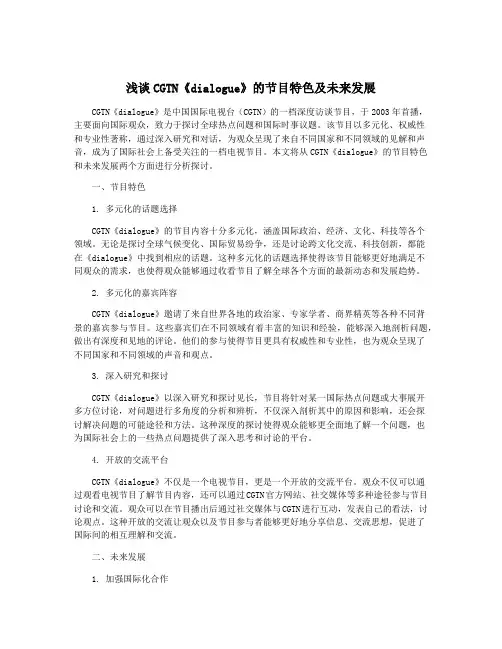
浅谈CGTN《dialogue》的节目特色及未来发展CGTN《dialogue》是中国国际电视台(CGTN)的一档深度访谈节目,于2003年首播,主要面向国际观众,致力于探讨全球热点问题和国际时事议题。
该节目以多元化、权威性和专业性著称,通过深入研究和对话,为观众呈现了来自不同国家和不同领域的见解和声音,成为了国际社会上备受关注的一档电视节目。
本文将从CGTN《dialogue》的节目特色和未来发展两个方面进行分析探讨。
一、节目特色1. 多元化的话题选择CGTN《dialogue》的节目内容十分多元化,涵盖国际政治、经济、文化、科技等各个领域。
无论是探讨全球气候变化、国际贸易纷争,还是讨论跨文化交流、科技创新,都能在《dialogue》中找到相应的话题。
这种多元化的话题选择使得该节目能够更好地满足不同观众的需求,也使得观众能够通过收看节目了解全球各个方面的最新动态和发展趋势。
2. 多元化的嘉宾阵容CGTN《dialogue》邀请了来自世界各地的政治家、专家学者、商界精英等各种不同背景的嘉宾参与节目。
这些嘉宾们在不同领域有着丰富的知识和经验,能够深入地剖析问题,做出有深度和见地的评论。
他们的参与使得节目更具有权威性和专业性,也为观众呈现了不同国家和不同领域的声音和观点。
3. 深入研究和探讨CGTN《dialogue》以深入研究和探讨见长,节目将针对某一国际热点问题或大事展开多方位讨论,对问题进行多角度的分析和辨析,不仅深入剖析其中的原因和影响,还会探讨解决问题的可能途径和方法。
这种深度的探讨使得观众能够更全面地了解一个问题,也为国际社会上的一些热点问题提供了深入思考和讨论的平台。
4. 开放的交流平台CGTN《dialogue》不仅是一个电视节目,更是一个开放的交流平台。
观众不仅可以通过观看电视节目了解节目内容,还可以通过CGTN官方网站、社交媒体等多种途径参与节目讨论和交流。
观众可以在节目播出后通过社交媒体与CGTN进行互动,发表自己的看法,讨论观点。
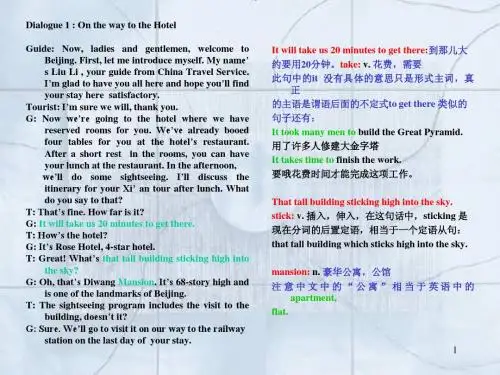
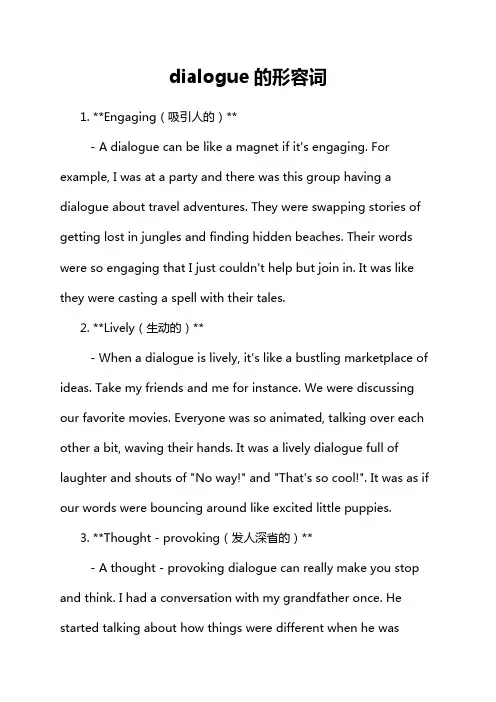
dialogue的形容词1. **Engaging(吸引人的)**- A dialogue can be like a magnet if it's engaging. For example, I was at a party and there was this group having a dialogue about travel adventures. They were swapping stories of getting lost in jungles and finding hidden beaches. Their words were so engaging that I just couldn't help but join in. It was like they were casting a spell with their tales.2. **Lively(生动的)**- When a dialogue is lively, it's like a bustling marketplace of ideas. Take my friends and me for instance. We were discussing our favorite movies. Everyone was so animated, talking over each other a bit, waving their hands. It was a lively dialogue full of laughter and shouts of "No way!" and "That's so cool!". It was as if our words were bouncing around like excited little puppies.3. **Thought - provoking(发人深省的)**- A thought - provoking dialogue can really make you stop and think. I had a conversation with my grandfather once. He started talking about how things were different when he wasyoung. His dialogue about the value of hard work and how they didn't waste anything back then made me question my own habits. It was like he shone a bright light into the corners of my mind thatI hadn't explored before.4. **Fascinating(迷人的)**- A fascinating dialogue is like opening a treasure chest. I was at a book club meeting and the discussion about the symbolism in the novel we read was just fascinating. People were making connections I'd never thought of. It was as if they were pulling out one shiny jewel of an idea after another from that chest of words.5. **Boring(无聊的)**- Oh, a boring dialogue is the worst! It's like being stuck in a slow - moving traffic jam of words. I had to sit through a meeting once where the guy just droned on about numbers and statistics. His dialogue was so boring that I felt my eyelids getting heavy. It was like he was reading from a really dull recipe book and I was the reluctant listener.6. **Exciting(令人兴奋的)**- An exciting dialogue is like a rollercoaster ride. When mysoccer team was in the locker room before a big game, our coach had an exciting dialogue with us. He was talking about strategies and how we could win. His words were full of energy, and we were all pumped up. It was like he was setting off fireworks in our minds.7. **Meaningful(有意义的)**- A meaningful dialogue is like a warm hug for the soul. I had a heart - to - heart with my best friend when I was going through a tough time. Her words of support and sharing her own experiences made it a really meaningful dialogue. It was as if she was building a bridge between our hearts with her kind words.8. **Awkward(尴尬的)**- An awkward dialogue is like walking on eggshells. I remember once when I accidentally bumped into an old acquaintance and we started talking. There were long pauses and we just couldn't find the right things to say. It was an awkward dialogue, like two left - feet trying to dance together.9. **Inspiring(鼓舞人心的)**- An inspiring dialogue can lift you up like a hot air balloon. I attended a seminar where the speaker had an inspiring dialoguewith the audience. He was talking about following your dreams and not being afraid of failure. His words were like wings, making me feel like I could soar to new heights.10. **Confusing(令人困惑的)**- A confusing dialogue is like being lost in a maze. I was in a class once when the professor was explaining a really complex theory. His words were all over the place and it was a confusing dialogue. It was as if he was handing me a bunch of jumbled - up puzzle pieces and expecting me to make sense of them right away.My view is that a dialogue can take on so many different qualities depending on the people involved, the topic, and the context. It can be a wonderful experience or a really dull one, but it always has the power to impact us in some way.。
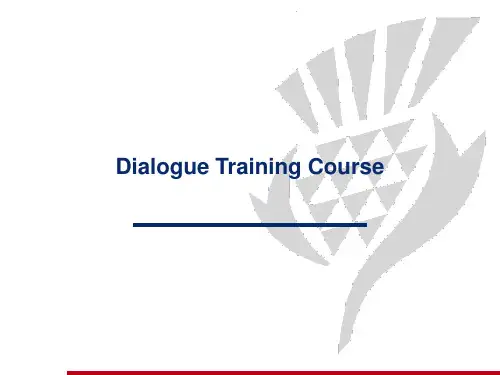
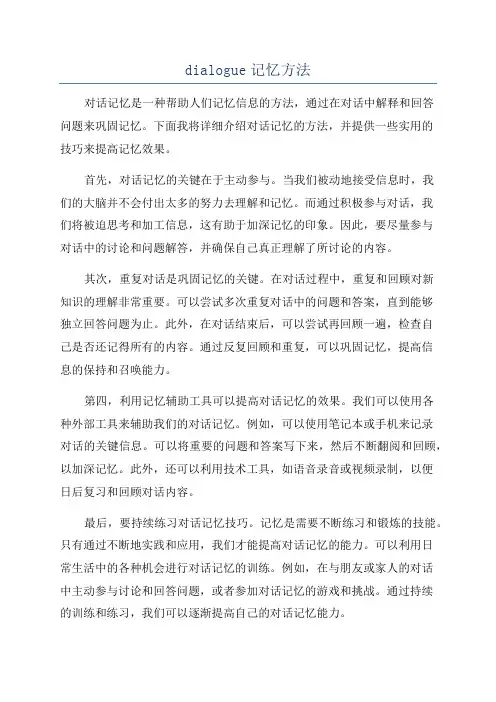
dialogue记忆方法对话记忆是一种帮助人们记忆信息的方法,通过在对话中解释和回答问题来巩固记忆。
下面我将详细介绍对话记忆的方法,并提供一些实用的技巧来提高记忆效果。
首先,对话记忆的关键在于主动参与。
当我们被动地接受信息时,我们的大脑并不会付出太多的努力去理解和记忆。
而通过积极参与对话,我们将被迫思考和加工信息,这有助于加深记忆的印象。
因此,要尽量参与对话中的讨论和问题解答,并确保自己真正理解了所讨论的内容。
其次,重复对话是巩固记忆的关键。
在对话过程中,重复和回顾对新知识的理解非常重要。
可以尝试多次重复对话中的问题和答案,直到能够独立回答问题为止。
此外,在对话结束后,可以尝试再回顾一遍,检查自己是否还记得所有的内容。
通过反复回顾和重复,可以巩固记忆,提高信息的保持和召唤能力。
第四,利用记忆辅助工具可以提高对话记忆的效果。
我们可以使用各种外部工具来辅助我们的对话记忆。
例如,可以使用笔记本或手机来记录对话的关键信息。
可以将重要的问题和答案写下来,然后不断翻阅和回顾,以加深记忆。
此外,还可以利用技术工具,如语音录音或视频录制,以便日后复习和回顾对话内容。
最后,要持续练习对话记忆技巧。
记忆是需要不断练习和锻炼的技能。
只有通过不断地实践和应用,我们才能提高对话记忆的能力。
可以利用日常生活中的各种机会进行对话记忆的训练。
例如,在与朋友或家人的对话中主动参与讨论和回答问题,或者参加对话记忆的游戏和挑战。
通过持续的训练和练习,我们可以逐渐提高自己的对话记忆能力。
总结起来,对话记忆是一种有效的记忆方法,通过积极参与、重复记忆、转化为图像或故事、利用记忆辅助工具以及持续练习,可以帮助我们提高对话记忆的效果。
希望以上的方法和技巧能对大家在对话记忆方面有所帮助。
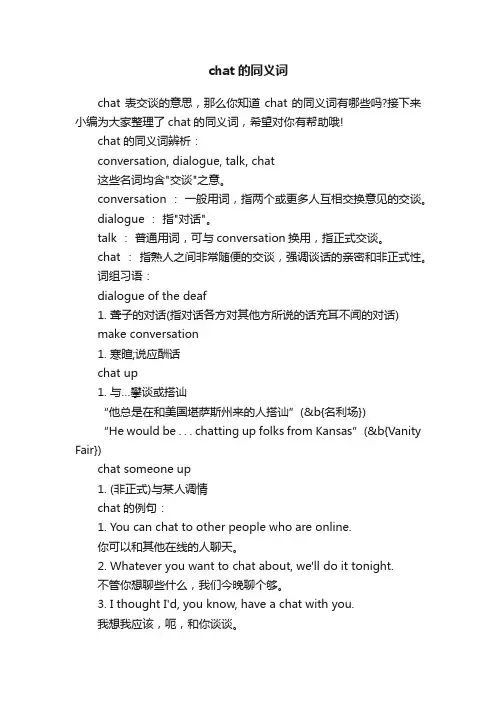
chat的同义词chat表交谈的意思,那么你知道chat的同义词有哪些吗?接下来小编为大家整理了chat的同义词,希望对你有帮助哦!chat的同义词辨析:conversation, dialogue, talk, chat这些名词均含"交谈"之意。
conversation :一般用词,指两个或更多人互相交换意见的交谈。
dialogue :指"对话"。
talk :普通用词,可与conversation换用,指正式交谈。
chat :指熟人之间非常随便的交谈,强调谈话的亲密和非正式性。
词组习语:dialogue of the deaf1. 聋子的对话(指对话各方对其他方所说的话充耳不闻的对话)make conversation1. 寒暄;说应酬话chat up1. 与…攀谈或搭讪“他总是在和美国堪萨斯州来的人搭讪”(&b{名利场})“He would be . . . chatting up folks from Kansas”(&b{Vanity Fair})chat someone up1. (非正式)与某人调情chat的例句:1. You can chat to other people who are online.你可以和其他在线的人聊天。
2. Whatever you want to chat about, we'll do it tonight.不管你想聊些什么,我们今晚聊个够。
3. I thought I'd, you know, have a chat with you.我想我应该,呃,和你谈谈。
4. I met him first at his house where we had a chat.我初次见他是在他家里,当时我们聊了一会儿。
5. Not being a mother, I found the chit-chat exceedingly dull.我没当母亲,所以觉得那样的闲谈无聊透顶。
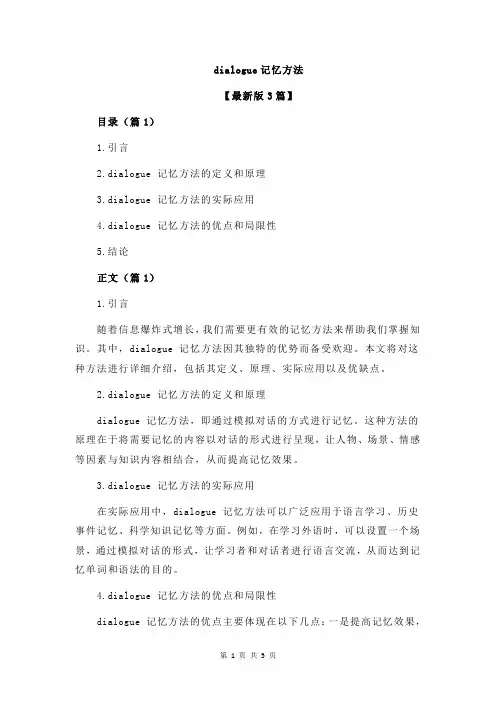
dialogue记忆方法【最新版3篇】目录(篇1)1.引言2.dialogue 记忆方法的定义和原理3.dialogue 记忆方法的实际应用4.dialogue 记忆方法的优点和局限性5.结论正文(篇1)1.引言随着信息爆炸式增长,我们需要更有效的记忆方法来帮助我们掌握知识。
其中,dialogue 记忆方法因其独特的优势而备受欢迎。
本文将对这种方法进行详细介绍,包括其定义、原理、实际应用以及优缺点。
2.dialogue 记忆方法的定义和原理dialogue 记忆方法,即通过模拟对话的方式进行记忆。
这种方法的原理在于将需要记忆的内容以对话的形式进行呈现,让人物、场景、情感等因素与知识内容相结合,从而提高记忆效果。
3.dialogue 记忆方法的实际应用在实际应用中,dialogue 记忆方法可以广泛应用于语言学习、历史事件记忆、科学知识记忆等方面。
例如,在学习外语时,可以设置一个场景,通过模拟对话的形式,让学习者和对话者进行语言交流,从而达到记忆单词和语法的目的。
4.dialogue 记忆方法的优点和局限性dialogue 记忆方法的优点主要体现在以下几点:一是提高记忆效果,通过人物、场景、情感等因素与知识内容相结合,使记忆更加深刻;二是增强趣味性,这种方法让学习过程更加生动有趣,提高学习积极性;三是提高学习效率,通过对话的形式进行学习,可以快速掌握知识内容。
然而,dialogue 记忆方法也存在一定的局限性。
首先,它对创作者的要求较高,需要具备一定的想象力和创作能力;其次,这种方法可能不适合所有人,对于一些学习者来说,对话形式可能无法满足其学习需求。
5.结论总的来说,dialogue 记忆方法是一种具有较高实用性和有效性的记忆方法。
通过模拟对话的方式进行记忆,可以提高记忆效果,增强趣味性,提高学习效率。
目录(篇2)1.引言2.dialogue 记忆方法的概念介绍3.dialogue 记忆方法的实际应用4.dialogue 记忆方法的优点与局限性5.结论正文(篇2)【引言】在日常学习和工作中,我们常常需要记忆大量的信息,而记忆力的强弱往往直接影响到我们的学习效果和工作效率。
A: Can I help you?有什么能帮你的吗?B: I'd like the double cheese burger meal, please.我要一个双层起司汉堡。
A: What kind of drink would you like with that?还想要什么饮料?B: Just coke will be fine.一杯可乐就行。
A: Would you like a super size meal? Only 2 RMB more, you'll get large coke and fries instead of medium. And today we are offering free toys all the meal boxes.你想要超级套餐吗?只要多加2元,就能把中等的可乐和薯条换成大的。
而且今天所有的套餐都有免费的玩具赠送。
B: That sounds good, thanks, I'd like that. Actually I'd like sprite instead of coke,thanks.A: That's not a problem, Miss. Will that be it?没问题,小姐。
就这些吗?B: Yes, that's all.是的,就这些。
A: That will be 25RMB, please总共是25元。
B: You got it.给你。
A: It's my treat this time. Could we get the bill?这次我请.麻烦结账.B: Here you go.给您.A: Here's $35 for the meal, and this fruit is for you.这是35块钱的饭钱,而水果是给你的.B: Lao Wang, it's usually customary to tip money.老汪,我们一般是用金钱来当小费的.A: But money's so impersonal. And besides, people don't eat enough fruit nowadays.但是金钱过于冷冰冰了.而且,现在的人们吃的水果太少了.B: You have a good point. I really like mango anyway. Thanks a lot. 您言之有理.我确实很喜欢吃芒果.非常感谢.A: Well, it looks like you've reinvented the tip!A: It's my treat this time. Could we get the bill?这次我请.麻烦结账.B: Here you go.给您.A: Here's $35 for the meal, and this fruit is for you.这是35块钱的饭钱,而水果是给你的.B: Lao Wang, it's usually customary to tip money.老汪,我们一般是用金钱来当小费的.A: But money's so impersonal. And besides, people don't eat enough fruit nowadays.但是金钱过于冷冰冰了.而且,现在的人们吃的水果太少了.B: You have a good point. I really like mango anyway. Thanks a lot. 您言之有理.我确实很喜欢吃芒果.非常感谢.A: Well, it looks like you've reinvented the tip!AA制Go dutchA:Ok, so what have you got in store for me tonight?好吧,那么你今晚为我准备了什么节目?B:I'm really sorry, Ethan. I tried so hard, but I'm afraid I couldn't find a Dutch restaurant in town. The best I could do was a German one about 15 minutes from here.真的很抱歉,伊桑.我找了又找,但恐怕真的没办法在城里找到一家荷兰餐馆.最接近你要求的就是一家德国餐馆,离这儿大约15分钟的路程.A:What? I don't understand.什么?我不明白你的意思.B:I thought you said you wanted to have Dutch food?我以为你说的是你要吃荷兰菜?A:Oh! Ha-ha! That's not what I mean when I said 'go Dutch'!通知:管理员 [【洛基国际讲师】°Katrina] 放麦,首位麦序上的人可以说话了。
浅谈CGTN《dialogue》的节目特色及未来发展【摘要】CGTN《dialogue》节目以国际视角深度探讨议题闻名,具有互动性强、客观公正的特色。
未来发展将拓展主题范围,增加话题多样性,加强嘉宾邀请提升节目影响力,并加强技术支持提升节目质量。
这些举措将进一步巩固节目在国际视野上的地位,为观众带来更多精彩内容。
CGTN《dialogue》的特色和未来发展前景显示出其在国际传媒领域的重要地位和发展潜力。
【关键词】CGTN, dialogue, 节目特色, 国际视角, 互动性, 客观公正, 主题范围, 嘉宾邀请, 技术支持, 质量, 未来发展, 影响力, 关键词1. 引言1.1 介绍CGTN《dialogue》节目通过与各国政要、学者、专家进行深入交流,CGTN《dialogue》能够呈现出客观公正的节目内容,为观众提供全面、多元的信息。
这一特色使得《dialogue》成为国际舞台上备受瞩目的节目之一,深受观众喜爱。
在快速变化的国际形势下,CGTN《dialogue》以其独特的节目特色和高质量的制作水平,赢得了良好的口碑和广泛的影响力。
随着中国在国际舞台上的地位日益显著,CGTN《dialogue》将继续发挥其重要作用,成为连接世界各地观众的桥梁和窗口。
1.2 强调其在国际视野上的地位CGTN《dialogue》节目在国际视野上具有重要地位。
作为中国国际电视台旗下的重要节目之一,该节目定位于深度访谈和对话,旨在向全球观众展示中国在国际事务中的立场和声音。
通过深度探讨国际关键问题,CGTN《dialogue》节目致力于为观众带来全面客观的信息和分析,促进国际交流与理解。
该节目不仅关注国际政治、经济、文化等多个领域的热点话题,还邀请了来自全球各界的专家学者和知名人士进行客观、深入的讨论,使节目具有了更广泛的国际影响力。
在当今全球化和多极化的背景下,CGTN《dialogue》节目在国际舞台上扮演着重要角色,为全球观众呈现了一个多元化、开放性的视野,展示了中国媒体的自信和开放。
DialogueWhat happens if you write bad dialogue? People will really hate reading it. Let’s take a look at good dialogue, bad dialogue, and some rules to help us write dialogue properly. The basic rulesDialogue should:∙Begin on a new line for each new speaker∙Have double or single quotation marks around the words people say. “I hate tomatoes,”Joel said.∙Have punctuation inside the quotation marks∙End the dialogue line with a comma if you’re adding a dialogue tag, but with a full stop (period) if yo u’re adding an action. A dialogue tag is something like he said.But anaction, like “She folded her arms,” is not a dialogue tag.Here’s an example:“Joe, please come here,” Sarah said. “We need to talk.”“What about?”“You know what.” She folded her arms.Notice that we don’t always need to add a dialogue tag. To make a good dialogue, don’t make everything into a pattern. You need variety and balance.More details about the basic rule s1 - Regular QuoteIn a regular quote, with no continuing or following sentence, use standard punctuation. "You didn't see her?""I didn't see her."2 - Quote as End of a SentenceIf the quote, whether there are other parts to the paragraph or not, is a sentence all its own, the same rule applies as in the first example I wrote."You didn't see her?" Detective Martin paced back and forth in front of the two way mirror, the click click of his shoes making me nervous."I didn't see her." He was trying to wear me down. I knew for a fact I didn't see her that night.3 - Do Not Capitalize a Sentence ExtensionSometimes the quote is just part of a bigger sentence. When the quote is part of a bigger sentence, the rest of the sentence is called the “extension.” The extension should not begin with a capital letter.The wrong way:"You didn't see her?" The detective asked.The right way:"You didn't see her?" the detective asked.Also do it this way if the extension is in the middle of the quote.Mr. Zhang re-opened his Powerpoint presentation. “We’re so lucky,” he declared, with the seriousness of a firefighter who has just put out a fire, “that I brought two flash drives with my lecture on them today.”4 - Knowing When to Use a CommaWhen you have a quote that ends with a period and it has a sentence extension on it, you need to replace the period with a comma.The wrong way:"I didn't see her." I told him.The right way:"I didn't see her," I told him.The wrong way:"I didn't see her." She whispered, holding back her anger.The right way:"I didn't see her," she whispered, holding back her anger.Now some tips about style.1.Base your dialogue in a scene. The dialogue should not just be two people talking.It’s too plain and boring and it won’t interest your reader.This means the dialogue needs to take place somewhere, with some kind of action.Where are your characters? A coffee shop? Driving in a car? At home?Who is nearby? Young children?The boss? Enemy spies?You don’t have to mention action or setting very often, but you should do it alittle bit.2.Your dialogue might need some back story. According to Stephen King, Backstory is all the stuff that happened before your tale began but which has animpact on the front story. Back story helps define character and establishmotivation. I think it’s important to get the back story in as quickly aspossible, but it’s also important to do it with some grace. As an example ofwhat’s not graceful, consider this line of dialogue:“Hello, ex-wife,” Tom said to Doris as she entered the room.This one is better:“Hi Doris,” Tom said. His voice sounded natural enough- to his own ears at least- but the fingers of his right hand crept to the place where his wedding ring had been until six months ago.3.Don’t let one person speak for too long. When people talk together, it shouldn’tbe like giving speeches. If one character has a lot of things to say, the othercharacter should occasionally interrupt to say something, or to ask a question Now let’s look at some bad and good dialogues.Version 1“Where are you going?” David asked.“I’m going home!” Julie said.“I don’t think you should,” he said.“Why not?” she asked.“Tony w ill be here soon. He wants to talk to you,” he said.“Well, I don’t want to talk to him,” she said.“It’s important that we solve the problem as soon as possible,” Johnsaid.“It’s your problem, not mine!” Julie said.“It’s everyone’s problem and you know it,” John said.“I’m going!” Julie said. Immediately, she went to the door, opened itand walked out.What do you think of it?Version 2“Where are you going?” David asked.“I’m going home!” Julie answered.“I don’t think you should.”“Why not?”“Tony w ill be here soon. He wants to talk to you,” he explained.“Well, I don’t want to talk to him,” she declared.“It’s important that we solve the problem as soon as possible,” John added.“It’s your problem, not mine!” she argued.“It’s everyone’s problem and you know it,” John continued.“I’m going!” Julie insisted. Immediately, she went to the door, opened it and walked out.Are there any good changes here? What is still missing?Version 3As Julie grabbed her bag and stood up, David asked, “Where are you going?”“Home!” she answered sharply.“I don’t think you should.”“Why not?” She stared at him. She w as beginning to dislike him.“Tony w ill be here soon. He wants to talk to you,” he explained calmly but firmly.He looked into her eyes, waiting for her reaction.“Well I don’t w ant to talk to him,” she declared. She was about t o continue towards the door when John suddenly joined the conversation.Not looking at either of them, he advised, “It’s important that w e solve the problem as soon as possible.”There was silence for a fe w seconds, as both Julie and David thought about their next move.“It’s . . .” Julie began, not yet sure of her words. “It’s your problem, not mine!” she argued. She stood her ground, angry.John continued, slow ly but surely. “It’s everyone’s problem and youknow it.” Still he refused to look at her, w hich made her even angrier. Seeing that neither John nor David w as interested in listening to her, she decided it was better to leave.“I’m going!” she insisted.Without waiting for their response, she marched to the door, opened it and walked out.Is this one better? Why?。